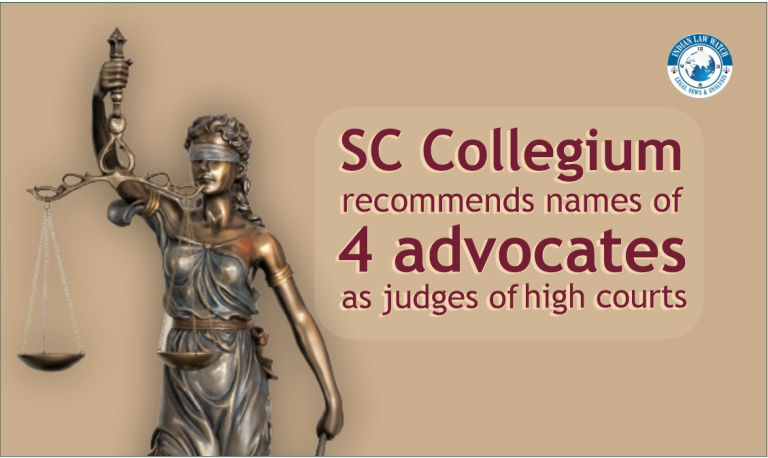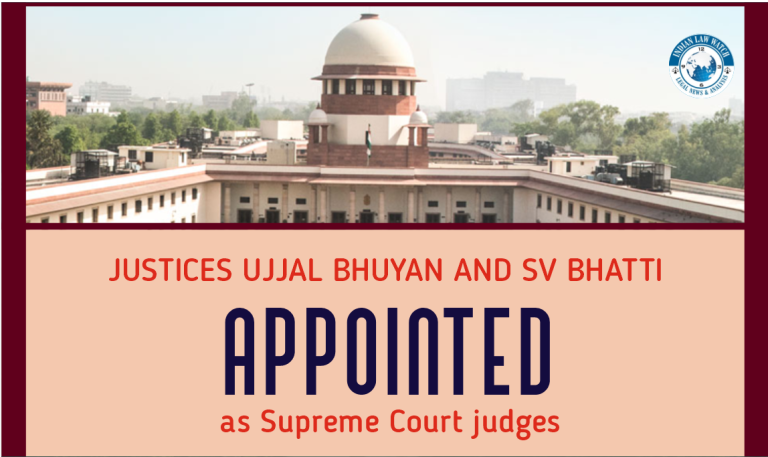

The New Appointments to the Supreme Court
Justices Ujjal Bhuyan (Former Chief Justice of Telangana High Court) and S Venkatanarayana Bhatti (Former Chief Justice of Kerala High Court) were sworn in recently as the judges of the Supreme Court taking the top court’s working strength to 32. In 2019, the strength of Supreme Court was increased to 34. Last in February 2023, Supreme Court was functioning with the full sanctioned strength. Chief Justice of India (CJI) D. Y Chandrachud administered the oath of office to them at a ceremony organized in the auditorium in the SC annexee Friday morning. To fill this up, the collegium headed by CJI Chandrachud deliberated on the names of Chief Justices and senior puisne judges of the high courts eligible for appointment with the other members of the collegium-Justices S. K. Kaul, Sanjiv Khanna, B. R Gavai and Surya Kant.

Justice Bhuyan Journey

Justice Bhuyan was appointed as a judge of the Gauhati High Court on October 17, 2011. He is the senior most judge of his parent high court and he was serving as Telangana HC Chief Justice since June 28, 2022. The collegium took note of his judgments covering wide ranging issues pertaining to law and justice” and a good reputation for integrity and competence. Born on 2nd August 1964 at Guwahati his father Suchendra Nath Bhuyan was a Senior Advocate and a former Advocate General of Assam. After graduating in Arts from Kirori Mal College, Delhi, he obtained his LL.B. degree from Government Law College, Guwahati and LL.M. degree from Gauhati University, Guwahati. He was transferred to Bombay High Court and took oath as a Judge of Bombay High Court on 03.10.2019. After a two-years as judge at Mumbai, he was transferred to Telangana High Court and took oath on 22.10.2021. He was the Executive Chairman of Telangana State Legal Services Authority. He was appointed as Chief Justice of High Court for the State of Telangana and assumed charge on of 28-06-2022.
Justice Bhatti

Justice Bhatti was appointed as a judge of the Andhra Pradesh High Court on April 12, 2013 and is the senior most in his parent high court. He was also appointed as Judge of the High Court of Judicature at Hyderabad for the State of Telangana and the State of Andhra Pradesh and assumed charge on 01.06.2014. Upon bifurcation and establishment of High Court of Judicature of Andhra Pradesh at Amaravathi on 01.01.2019, was sworn-in as a judge of Andhra Pradesh High Court and later transferred and appointed as Judge of the High Court of Kerala w.e.f. 19.03.2019 and was serving in as Chief Justice there since June 1, 2023.
At the SC, Justice Bhatti and Justice Bhuyan will have a term till May 6, 2027, and August 2, 2029 respectively.

The Collegium of the Supreme Court has also recommended the names of four Additional Judges for appointment as permanent Judges of the High Court of Kerala in the following terms:
- Shri Justice Basant Balaji,
- Shri Justice Chandrasekharan Kartha Jayachandran,
- Justice Sophy Thomas, and
- Shri Justice Puthen Veedu Gopala Pillai Ajithkumar.
The Collegium of the Supreme Court recommended the names of five Additional Judges for appointment as permanent Judges of the Gauhati High Court.

International Case Study
USA
In USA, the President nominates someone for a vacancy on the Court and the Senate votes to confirm the nominee, which requires a simple majority, and they serve until their death, retirement, or conviction by the Senate.
Singapore Judiciary
Singapore judiciary is known today for the efficiency. The structure of the Supreme Court at Singapore is headed by the Chief Justice, who is supported by the:
- Supreme Court Bench.
- Supreme Court Registry.
- Judiciary Administration and Operations.
- Singapore Judicial College, which serves the learning and development needs of judicial officers.
Unpredictable judiciary is recognised world over as an obstacle to economic operations. According to World Bank Report on Judicial reforms in Singapore [World Bank Report No. 38779 titled “Judiciary-Led Reforms in Singapore]- more recruitment to subordinate judiciary lowers the burden on Appellate Courts. In last 30 years, Singapore over the years increased the judges at subordinate judiciary entertains in a year, more than 95% of cases are dealt with by the subordinate judiciary. Other than that, fewer vacancies due to appointments and Re- appointments of judges also helps to ease the pressure.
The Ministry of Law and Justice of India had informed the Rajya Sabha that district courts in India have a total vacancy of 5,850 judges. As of December 19, 2022, out of the sanctioned strength of 25,042, there was a vacancy of 5,850 judges. Minister of Law and Justice Kiren Rijiju told Parliament that,
“From 01.01.2020 till 19.12.2022, 12 judges have been appointed to the Supreme Court of India. In the case of high courts, 351 judges have been appointed in various high courts of the country. As of 19.12.2022, against the sanctioned strength of 34 judges, 28 judges are working in the Supreme Court of India, leaving a vacancy of 6 judges. In the case of the High Courts, against the sanctioned strength of 1108 judges, 775 judges are working in the High Courts, and there is a vacancy of 333 judges to be filled.”
It is widely recognized in various study that persistent vacancies in a busy court increase the length of time that litigants and businesses wait for their day in court and increase case backlogs that perpetuate delays in the future. The Supreme Court of India has a sanctioned strength of thirty-four Judges and after this appointment two vacancy remains to augment the working judge-strength to take care of the backlog of cases and the large institution of fresh matters.
In Imtiyaz Ahmad vs. State of Uttar Pradesh, Supreme Court (2017)
- Until National Court Management Committee (NCMSC) formulates a scientific method for determining the basis for computing the required judge strength of the district judiciary, the judge strength shall be computed for each state, in accordance with the interim approach indicated in the note submitted by the Chairperson, NCMSC;
- The state governments shall cooperate in all respects with the High Courts in terms of the resolutions passed in the joint conference of Chief Justices and Chief Ministers in April 2016 with a view to ensuring expeditious disbursal of funds to the state judiciaries in terms of the devolution made under the auspices of the Fourteenth Finance Commission;
The High Courts shall take up the issue of creating additional infrastructure required for meeting the existing sanctioned strength of their state judiciaries and the enhanced strength in terms of the interim recommendation of NCMSC;





